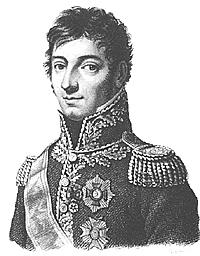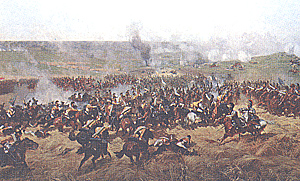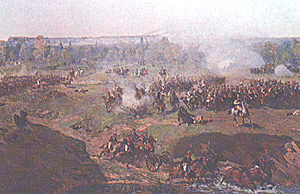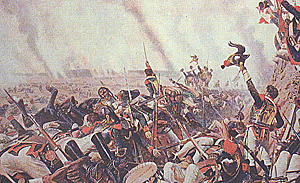Napoleon's Cavalry Commanders
# 8: General Charles Lefebvre Desnouettes
by Terry J. Senior
| |
He was a highly skilled horseman and a gifted commander. Born of bourgeois parents Jean-Claude Lefebvre and his wife Mlle A Leduc, in the Pont Neuf district of Paris where his father ran a drapery business and as such, was a supplier to the French army. Born in 1773 he originally enlisted in December 1789 but twice his parents purchased his release. The third time, they conceded defeat and he embarked on what was to prove a highly successful career. He made steady progress through the ranks and saw action in Belgium in 1798 and later Marengo, and a whole series of important conflicts across the length and breadth of Europe, right up to Waterloo. He was made ADC to Napoleon when he became Premier Consul. He was promoted to General de Brigade in 1806, and General de Division in December 1807, at the age of 34. There was just one stain on an otherwise unblemished career. This occurred at Benevente in Spain on the morning of the 29th December 1808. Lefebvre took a detachment of his Chasseurs-a-Cheval de la Garde Imperiale (some 500 officers and men) across the river Esla unaware that there was a substantial body of enemy cavalry still present in the town. The error was entirely of his own making and moreover elementary to an officer of his standing, experience and ability.
Approximately 60 of Lefebvre’s men were also captured by the 10 th Hussars who were commanded by General Henry William Paget. Other French officer casualties included Lieutenant Bocheux who was killed and Capitaines Geist and Cayre who were among the wounded. The General was paroled at Cheltenham and in due course was joined by his wife Stephanie who had been granted a passport by the Emperor following a suggestion by General Lejeune who himself had only recently made good his escape from Ashby de la Zouch. The General and Stephanie became extremely popular locally and their attendance at social events was a matter of great demand. Some years earlier, the Emperor had given the Lefebvre a signet ring of great value. The ethos of parole was trust and when in late 1811, Lefebvre, using the ring as a bribe, broke his parole and escaped back to France, the English public, especially those in Cheltenham were outraged, and all manner of inaccurate stories ensued.
On Napoleon's return from Elba in February 1815, Lefebvre together with the Lallemand brothers, both of whom were Generals, and General Antoine Rigau made an attempt to take the garrison and arsenal of La Fere but were foiled by men loyal to Louis XVIII led by the one armed General Augustine-Marie d’Aboville. After the defeat of Waterloo, Lefebvre and his three principal accomplices were proscribed by the subsequent Ordonnance and fled to the United States. Lefebvre lived there until 1821 when his wife had managed to secure permission for him to return to Amsterdam and there await the final invitation to re-enter France.
Sadly, he did not get to see his only daughter, Charlotte-Lavinie, who must have been conceived just prior to Waterloo. Charlotte was later the recipient of a large inheritance of 100,000 francs from the Emperor's estate. Lefebvre was a fine soldier and a commander of the highest order. The only two blemishes on an otherwise remarkable and loyal career were the circumstances of his capture at Benevente, and his escape from Cheltenham, which, to the English anyway, destroyed his honour. Napoleon's Cavalry Commanders # 6 - # 11
6: General Etienne Marie Antoine Champion de Nansouty 7: General Frederic Louis Henri Walther 8: General Charles Lefebvre Desnouettes 9: General Nicolas Dahlmann 10: General Pierre David (Eduoard) Colbert de Chabanais 11: General Marie Victor Nicolas de Fay Latour Maubourg Other CommandersNapoleon's Cavalry Commanders # 1 - # 5
1: General Louis-Pierre Montbrun 2: General Antoine-Louis-Charles LaSalle 3: General Francois-Etienne Kellermann 4: General Jean-Joseph Ange d’Hautpoul 5: General Claude-Pierre Pajol Napoleon's Cavalry Commanders # 12 - # 14
12: General Claude-Etienne Guyot 13: General Auguste-Francois-Marie de Colbert-Chabanais 14: General Jean-Pierre-Joseph Bruyere Napoleon's Cavalry Commanders # 15 - # 17
15: General Jean-Louis-Brigitte d’Espagne 16: General Louis Lepic 17: General Hippolyte-Marie-Guillaume de Rosnyvinen Comte de Pire Napoleon's Cavalry Commanders # 18 - # 20
18: General Francois Fournier-Sarlovese 19: General Louis-Michel Letort 20: General Edouard-Jean-Baptiste Milhaud Bibliography Back to Table of Contents -- First Empire #67 Back to First Empire List of Issues Back to MagWeb Master Magazine List © Copyright 2002 by First Empire. This article appears in MagWeb (Magazine Web) on the Internet World Wide Web. Other military history articles and gaming articles are available at http://www.magweb.com |
 General Charles LEFEBVRE-DESNOUETTES was one of the most loyal of Napoleon’s officers.
General Charles LEFEBVRE-DESNOUETTES was one of the most loyal of Napoleon’s officers.
 He ought to have had scouts well ahead of his
force to foresee and avoid just that eventuality. Having reached the opposite
bank, the French were first attacked by a regiment of English light dragoons. The
General, who lost his sabre in the river during the action, was wounded and
taken prisoner by a German dragoon named Bergman who is stated to have
then given up his prize to a trooper Grisdale of the 10 th Hussars.
He ought to have had scouts well ahead of his
force to foresee and avoid just that eventuality. Having reached the opposite
bank, the French were first attacked by a regiment of English light dragoons. The
General, who lost his sabre in the river during the action, was wounded and
taken prisoner by a German dragoon named Bergman who is stated to have
then given up his prize to a trooper Grisdale of the 10 th Hussars.  However, the escape was made good, much to the delight of the French military
high command and the General took his rightful position at the head of his Chasseurs-a-Cheval in time for the
disastrous Russian Campaign of 1812. I wonder if there was any time that he wished that he had remained a prisoner
in Cheltenham.
However, the escape was made good, much to the delight of the French military
high command and the General took his rightful position at the head of his Chasseurs-a-Cheval in time for the
disastrous Russian Campaign of 1812. I wonder if there was any time that he wished that he had remained a prisoner
in Cheltenham.  At the end of
April 1821 he took passage in a ship called the "Albion", a vessel belonging to the "Black Ball" line, which, on approaching the coast of southern Ireland encountered very severe weather and sank just off Kinsale. Lefebvre was
among those who lost their lives.
At the end of
April 1821 he took passage in a ship called the "Albion", a vessel belonging to the "Black Ball" line, which, on approaching the coast of southern Ireland encountered very severe weather and sank just off Kinsale. Lefebvre was
among those who lost their lives.